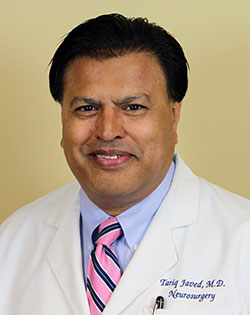What is your background in medicine and how did it lead you to where you are now?
 I grew up in Birmingham, England. My father died of a head injury following an automobile accident when I was 12 years old. I always excelled in science and mathematics in high school, and this naturally led to a career in science and then medicine. After finishing medical school at the Birmingham University School of Medicine and Dentistry in Birmingham, England, I passed the written part of the Fellow of the Royal College of Surgeons (FRCS) examination. I began a general surgery residency in Baltimore, Maryland. During my first year of residency, I had the opportunity to rotate through neurosurgery and worked with a recently trained young neurosurgeon. I assisted him on a craniotomy for treating trigeminal neuralgia. Observing the beautiful, live, pulsating brain through a small opening in the skull using an operating microscope was an awe-inspiring experience which very few people get an opportunity to experience. This experience led me to change to neurosurgery shortly afterwards. I matched with the Indiana University Neurosurgery Program and began my training with one year of neurology. I subsequently completed five years of neurosurgery in the Department of Neurosurgery.
I grew up in Birmingham, England. My father died of a head injury following an automobile accident when I was 12 years old. I always excelled in science and mathematics in high school, and this naturally led to a career in science and then medicine. After finishing medical school at the Birmingham University School of Medicine and Dentistry in Birmingham, England, I passed the written part of the Fellow of the Royal College of Surgeons (FRCS) examination. I began a general surgery residency in Baltimore, Maryland. During my first year of residency, I had the opportunity to rotate through neurosurgery and worked with a recently trained young neurosurgeon. I assisted him on a craniotomy for treating trigeminal neuralgia. Observing the beautiful, live, pulsating brain through a small opening in the skull using an operating microscope was an awe-inspiring experience which very few people get an opportunity to experience. This experience led me to change to neurosurgery shortly afterwards. I matched with the Indiana University Neurosurgery Program and began my training with one year of neurology. I subsequently completed five years of neurosurgery in the Department of Neurosurgery.
After completing my neurosurgery residency, I completed a fellowship in skull base and microsurgery at the University of Pittsburgh, Pittsburgh, PA under world renowned Professor Peter Janetta and Professor Laligham Sekhar.
The anatomy and connections of the brain are so complex, that despite all the research efforts, we still only know approximately 10% of how the brain functions. It is often referred to as “the last frontier of research in medicine.” Neurosurgery is a fascinating field in that you are foremost a diagnostician, and secondly, you get to operate on the most complex structure created in the universe by The Almighty. Of all the fields of surgery, neurosurgery has one of the biggest impacts on the patient’s well-being. You can take a patient to the operating room literally on their death bed, and once you are finished, you can save their life by your surgical intervention.
These are exciting times to be in neurosurgery. Technological advances in computing have had a major impact on the field of neurosurgery. Powerful computer technology has allowed us to see pathology inside the human brain (CT, MRI scans) without opening the skull or the brain. This, along with intraoperative navigation and intraoperative MRI-CT scans, has made the surgery a lot safer for all of our patients with faster return to normal function.
Neurosurgery is a field of medicine that is constantly evolving and changing for the better. It requires a dedicated effort to attend meetings and courses to keep up with the latest advances in the field. Approximately 50% of procedures I perform now did not exist during my residency training. Therefore, one has to be committed to lifelong learning to stay abreast of the progress in neurosurgery. We have gone from maximally invasive procedures in the brain and spine to perform similar procedures through minimally invasive techniques using smaller openings with endoscopes. Our patients have benefited from these minimally invasive procedures with less pain, complications, and rapid recovery.
What would you say sets your practice apart from others?
Since I am a solo practitioner, I want to be easily accessible to my patients as opposed to larger practices. I see every patient that comes to my office, and although I have a physician assistant helping me with your care, all the decision-making goes through me. You will get a live, friendly person responding to your calls instead of a computerized answering system. Since we are a small practice, you will continue to see the same person at each visit.
How do you view the relationship between you and the patient?
I strongly believe that patient trust is an integral part of the doctor/patient relationship. This trust is created by continuity of care by seeing the same patient and same faces in the office at each visit. During our office hours, you should be able to contact the person you are familiar with and who is knowledgeable about your medical condition and your care. I pride myself on giving individualized attention to each patient, rather than using a “cookbook method” for care. I also try to keep up with the latest developments in neurosurgery by attending conferences and courses to strive to improve the quality of care for our patients. We attempt to perform most surgical procedures minimally invasive, if possible. However, if a procedure cannot be done minimally invasive, we still use the most advanced and latest techniques and technology to give you the best available care.
I feel it is a great honor and privilege for someone to entrust me to operate on their brain or spine. This is a privilege so few people have the opportunity to experience.
What’s the value of patient education in your practice?
Patients undergoing surgery are under a tremendous amount of stress. Patient education is an integral part of preparing the individual for surgery and it helps reduce their stress level. A well-educated patient is one who tends to have less complications and have a faster recovery. To help towards these goals, we do hands-on education using spine or brain models to educate the patient prior to the procedure. On our website we also have videos of certain procedures that have been performed personally by me, along with video testimonials of patients to try and prepare patients for the surgery. We also provide patients a set of instructions prior to surgery on how to prepare for surgery and also postoperative care. In addition, we are available 24 hours per day in case patients have questions postop, or have complications postop so they can be addressed immediately.
Dr. Javed specializes in many surgical treatments, some of which can be performed using a minimally invasive approach. His surgical practice encompasses surgery for disc disease and arthritis of the spine, brain tumor, aneurysm and skull base surgery, spinal disorders, cervical and lumbar disc herniation and carpal tunnel release. This is only a select few of the surgical skills Dr. Javed provides.
Named one of the Top Neurosurgeons in the Atlanta Area

Top Doctors Atlanta Magazine – 2001, 2005, 2007, 2009, 2010, 2011, 2012, 2013, 2014, 2015, 2016, 2017, 2018, 2019
Top Doctors Across America – 2002, 2003, 2004, 2006
Top Surgeons Across America – 2007, 2008, 2010, 2011, 2012, 2013
Getting To Know Tariq Javed, M.D., F.I.C.S., F.A.C.S., F.A.A.N.S.
Serving residents of the North Metro Atlanta area as well as Georgia and surrounding states of Alabama, Florida, and the Carolinas, neurosurgeon Tariq Javed, prides himself on providing personalized attention to each of his patients. Dr. Javed not just wants to be your neurosurgeon, but he wants to be a trusted friend you can rely on. He is a strong believer in honesty and treating you as he would treat his family members. He may even advise you against a surgical procedure if he feels it is unnecessary and against your best interest. Tariq Javed, M.D., P.C., is run as a boutique single neurosurgeon practice providing you with easy, personalized access to Dr. Javed, compared to large multiple group practices. In addition, due to Dr. Javed’s extensive training and years of experience, you will receive state-of-the-art, latest surgical treatment for your medical needs.
Dr. Javed has written numerous articles and book chapters on brain and spine surgery. His main area of interest is in the surgical treatment of complex skull-based lesions and minimally invasive approaches to the skull base includes endoscopic endonasal techniques for surgery. He also specializes in minimally invasive surgical techniques for spinal disease.
Dr. Javed moved to Atlanta in 1991, and was initially on staff at Piedmont Hospital and Shepherd Spinal Center before moving to Marietta, Cobb County. He is a Fellow of the American College of Surgeons, Fellow of the International College of Surgeons, Fellow of the American Association of Neurological Surgeons, and many other respected neurosurgical associations. Dr. Javed has been named by Atlanta Magazine and Guide to America’s Top Doctors by the Consumers’ Research Council of America, as one of the top neurosurgeons in the Atlanta area 2002-2019. He has also been named by U.S. News and World Report as one of the top neurosurgeons in the country.
Hospital Affiliations:
- NORTHSIDE HOSPITAL CHEROKEE, CANTON, GA – ACTIVE STAFF
- NORTHSIDE HOSPITAL ATLANTA, ATLANTA, GA – ACTIVE STAFF
- WELLSTAR KENNESTONE REGIONAL MEDICAL CENTER, MARIETTA, GA – COURTESY STAFF
- SHEPHARD SPINAL CENTER (1991 – 2001)
